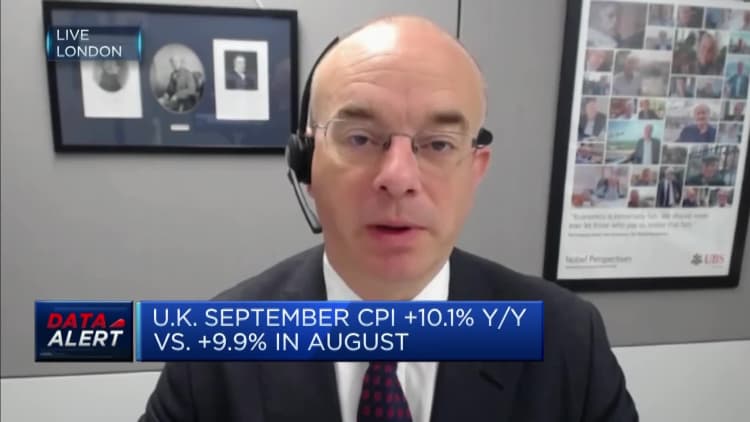European stocks nudge higher as UK PM resigns
European markets reversed early losses to end the day 0.25% higher, on a day which saw political turbulence in the U.K. culminating in the prime minister’s resignation.
The U.K.’s FTSE 100 closed 0.27% higher and the pound gained around 0.7% against the dollar.
France’s CAC 40 closed up 0.7% and Germany’s DAX index rose 0.2%.
Dutch firm Be Semiconductor led stock gains, rising 15% despite warning of an industry downturn. Meanwhile Ericsson and Nokia slipped 14% and 7.5%, respectively, after both missing analyst profit forecasts.
— Jenni Reid
Stocks on the move: Besi up, Ericsson and Nokia down
Dutch semiconductor firm Besi was the top gainer among European stocks, rising 13% despite reporting lower net income for the first nine months of the year and warning of a “new industry downturn.”
At the other end of the index, Swedish telecoms company Ericsson fell 15% after reporting lower earnings and missing analyst forecasts. Nokia dropped 7% after it also failed to hit profit forecasts.
— Jenni Reid
Sterling buoyant and gilt yields lower as UK PM Liz Truss resigns
Sterling is up 0.5% to trade at around $1.1214 early afternoon following the resignation of Liz Truss as U.K. Prime Minister. Government bonds also reacted positively to the news, with 10-year gilt yields falling four basis points to 3.842%.
— Hannah Ward-Glenton
UK Prime Minister Liz Truss resigns
Liz Truss announced she is resigning as British Prime Minister as she was elected “with a mandate for change” but was not able to “deliver that mandate.”
Read the full story here.
— Hannah Ward-Glenton
Sterling rallies as UK PM Liz Truss set to speak outside Downing Street
Market bets on rate hikes would hit the economy, BoE deputy governor says
The Bank of England’s Deputy Governor Ben Broadbent told investors that betting on big increases in interest rates would deliver a “pretty material” hit to the economy.
Broadbent said it’s unclear how the British government’s new energy price cap plan will affect inflationary pressure in the medium term, after new Finance Minister Jeremy Hunt scaled back the original plans.
— Hannah Ward-Glenton
German producer prices above market expectations
Germany’s Federal Statistical Office said Thursday morning that producer prices in the country rose by an annual 45.8% in September.
Economists had been expecting a figure of 44.7%, according to Reuters. This adds to concerns that wider inflation figures will keep rising over the coming months.
—Matt Clinch
Nordic telecom companies dip: Ericsson down 12%, Nokia down 5%
Shares of Ericsson dropped 12% following third quarter earnings, while Nokia is down 5% in early trade.
Both companies’ operating margins suffered from rising costs and contract delays.
— Hannah Ward-Glenton
European markets: Here are the opening calls
European markets are heading for a negative open on Thursday as investors assessed continuing economic uncertainty.
The U.K.’s FTSE index is expected to open 37 points lower at 6,899, the German DAX down 106 points at 12,635 and the French CAC down 52 points at 5,988, according to data from IG.
Regional markets closed slightly lower Wednesday afternoon as traders digested new inflation data for the U.K. and assessed rate hike expectations and recession fears.
The U.K. reported a rise in the consumer price index to 10.1% Wednesday, matching the 40-year high posted by the Office for National Statistics in July. Food, energy and transport prices drove the increase.
On the data front in Europe, French business climate data for October is due. Earnings are due from Hermes, Kering, L’Oreal, Pernod Ricard, Vivendi, Akzonobel, ABB, Nokia and Volvo Group.
— Holly Ellyatt
CNBC Pro: Chip stocks have been down all year — but one looks ‘really inviting’, says fund manager
Semiconductor stocks have been beaten down this year, but investors with a longer-term view on the importance of chips to secular trends such as 5G, electrification and artificial intelligence could look to buy the dip.
Hedge fund manager David Neuhauser shares one chip stock he likes.
Pro subscribers can read more here.
— Zavier Ong
Sterling extends losses as UK PM Liz Truss addresses Parliament
UK markets now come with a ‘competence risk premium,’ economist says
The last couple of weeks have put a “competence risk premium” into the financial markets, Paul Donovan, chief economist at UBS Wealth Management, said on CNBC’s “Squawk Box Europe.”
“Financial markets have judged the U.K. government to not be as competent as it could’ve been,” Donovan said.

CNBC Pro: Taking cover in bonds ahead of a recession? BlackRock says that’s an ‘obsolete’ playbook
Recession fears are roiling markets, but the typical playbook of taking cover in sovereign bonds is “obsolete,” says BlackRock.
“In this environment, bond vigilantes are back and heralding term premium’s return,” BlackRock said, adding that it’s underweight on government bonds.
The asset manager says that investors can still buy other types of bonds, however.
CNBC Pro subscribers can read more here.
— Weizhen Tan





















Discussion about this post